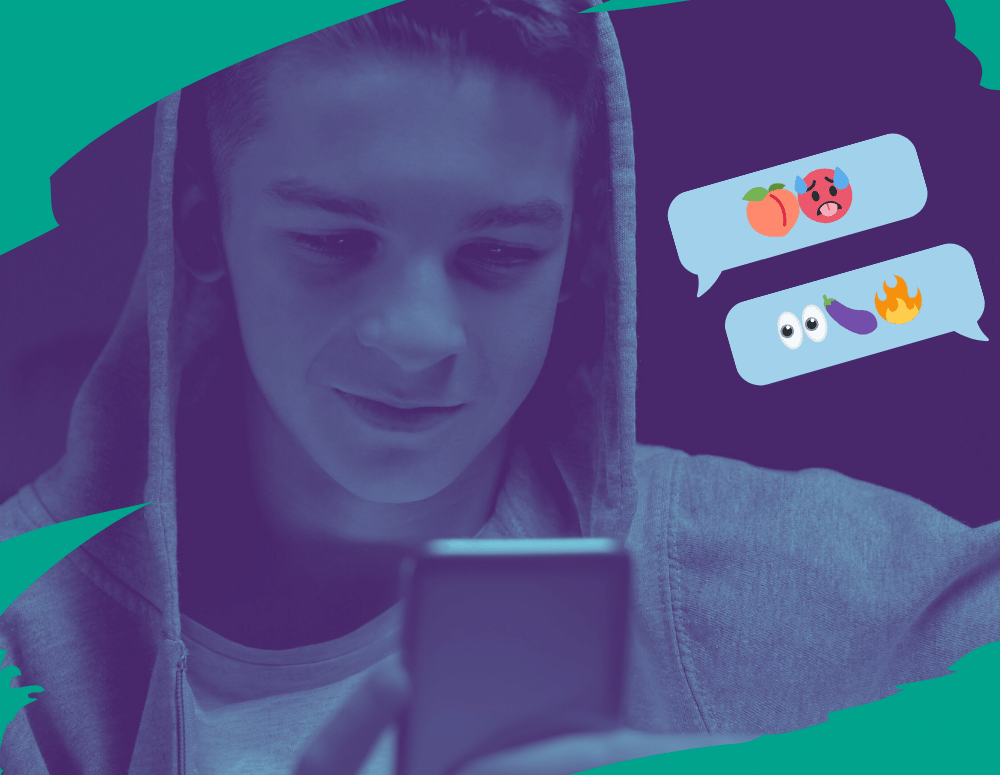Don’t forward it to anyone
Sexting
You’ve probably heard of sexting. It’s when you send or receive a message that has sexual content like a nude picture, sexy words, a video, or a live chat or live stream.

What you need to know about sexting
Sexting can be a way for teens to have fun and explore their identity, sexuality, and intimacy with partners.
Not all teens sext, and older teens are more likely to do so. But those who do can have very different experiences because it can be hard to know whether the person receiving the sext will be respectful with it by keeping it private or abuse the trust you have given them and share them with others.
Here are some important things to keep in mind before you sext to ensure that sexting is consensual, safer, and more private for you.
Why do people sext?
People express their sexuality in lots of different ways, and sexting is one of those ways. They might sext because they want to:
Explore their sexuality
Explore trust and intimacy in a relationship
Build self-confidence
Explore their identity
Stay connected in a long-distance relationship
To have fun, because it feels pleasurable (or nice), and to flirt with someone you like
What are some of the dangers/risks associated with sexting?
Sexting does carry risks that can cause harm – and it’s important to understand these risks if you are ever considering sexting.
Permanency
Sexting can be difficult – and even impossible – to take back or undo.
Reputation
People can and have experienced bullying, harassment and other mistreatment after sending a sext.
Emotional harm
Sexting can feel right at the time – and some people have only positive experiences and emotions around sexting. Some people might find they feel guilty, ashamed, or regret after sexting.
Image-based abuse is a type of abuse that happens online. There are many kinds of image-based abuse, such as sexual exploitation, ‘revenge porn’ and sextortion. Image-based abuse is very serious and causes a lot of harm. Unfortunately, it’s also on the increase.
Getting in trouble
For some people, there is a risk of getting in trouble (e.g. with parents or caregivers) if they sext.
Depending on your age, location, and other circumstances, sexting can sometimes be against the law.
The best way to stay safe from harm is to not sext.
Keeping your sexts private
If you decide you are going to sext, there are some things you can do to prevent possible harm now and in the future. Here are some strategies that can help make sexting more private:
- Sexting on apps that are end-to-end encrypted to ensure that they can only be viewed by you and the person you're sending them to
- Using apps that use have message expiration times so that you can set them to delete after you're finished (just FYI, this doesn’t protect you from people screenshotting the sext before it vanishes)
- Not sexting on apps that link to your personal information
- Turning off automatic cloud backup of your photos and videos
- Not using photos of your face, or including recognisable parts of your body or things in the background
- Using a VPN
- Double checking who you are sending the sext to before hitting send
- Watermarking the image
Remember that none of these strategies is a guaranteed way to keep sexts privates or stay safe online.
How do I know if it’s ok to sext someone?
It’s NEVER ok for someone to pressure, pester, threaten or trick you into sexting.
Deciding to sext someone means you need to make some decisions about consent, trust, and respect for each other's information and privacy.
If they’re keen, reflect first on how you are going to keep their sexts private, and think about what you feel comfortable sharing.
Here are some questions you might like to consider before you send a sext:
- Do I know this person IRL? Have I known them for a while and feel I can trust them?
- How can I be sure that this person is who and what they say they are?
- If I am under 18, is this person a similar age to me?
- Do I want to sext with this person as much as they want to sext with me? (Or is there something else that I'd prefer to do that is intimate?)
- If I don't want to sext, is this person ok with this? (Or do they try to pressure, pester, trick or threaten me into sexting?)
- If I want to sext, have I talked to this person about what I'm ok with and what I'm not ok with doing? (Were they ok with this?)
- Have I thought about ways that I might keep my sexts private from others?
- If I change my mind in the future, or my relationship with this person changes (e.g. a fight or break up), will I still be able to trust them? Would they completely delete my sexts if I asked them to?
- Do I know what the risks are – and what to do if something goes wrong?
Did you know? Sharing someone else's nude images or videos is a form of image-based abuse and is against the law
Even though it’s against the law, what you share with others could still become public
When you send a nude of yourself to someone, what happens to it and where it goes next is often out of your control. Your photo or video could end up anywhere.
You may trust the person you're sexting with right now, but people can change, and unexpected things can happen.
Remember - breakups can get toxic, nudes might be sent to others or shared online, and your phone or account (or the phone/accounts you sext with) could be stolen or hacked.
If someone shares your sexts without your consent, remember that it is not your fault! Sharing someone's sexts in this way is a form of image-based abuse.
There are people who will support you if you are in this situation (including Kids Helpline). It’s important to get help asap as there are things you can do to stop images being shared or get images that have been shared back or removed.
Sexting and the Law
Taking, sending or receiving a sexy image of a person under 18 is illegal in some States. For information about sexting laws, check out Youth Law Australia.
It is also against the law to share or threaten to share or create intimate/sexual photos or videos of someone without their consent.
To learn more check out our revenge porn and image-based abuse article.
What if I receive a sexual image or message that I don’t want?
Delete the message
Report the image (if it’s online) so it can be removed
Tell the person not to send any more & block them if they do
Change your mobile number
Make a report to your mobile phone company if they don’t stop
Report Image Based Abuse
You're not alone when it comes to dealing with sexting!
If you think or know the image is not being shared consensually, report it to ACCCE (under 18s) or eSafety (over 18s)


What to do after you send a sext you regret
Take a deep breath. We understand how easily things can get out of hand, even when you didn’t mean them to.
Here’s what you can do if you send a sext you regret:
- Ask the person to delete your message and watch them do it
- Talk to someone you trust like a friend, parent, counsellor or teacher
- Make a report to your mobile phone company if you’re receiving unwanted pictures or requests
Here’s what to do if your image gets shared online:
- Un-tag yourself from the photo
- Report the image so it can be removed
- Report the person who posted it
Check these out too:
Revenge porn and image-based abuse
‘Revenge porn’ is a type of image-based abuse that can happen online. ...
READ MESextortion: What it is and what to do about it
‘Sextortion’ is a type of image-based abuse that can happen online. If ...
READ MECyberbullying
If you’re experiencing cyberbullying, you’re not alone. It can be ...
READ MEOnline Harassment
Being harassed online is a serious form of cyberbullying that is against ...
READ ME
Talking helps! We’re here for you.
No problem is too big or too small.
We're here 24 hours a day, 7 days a week






